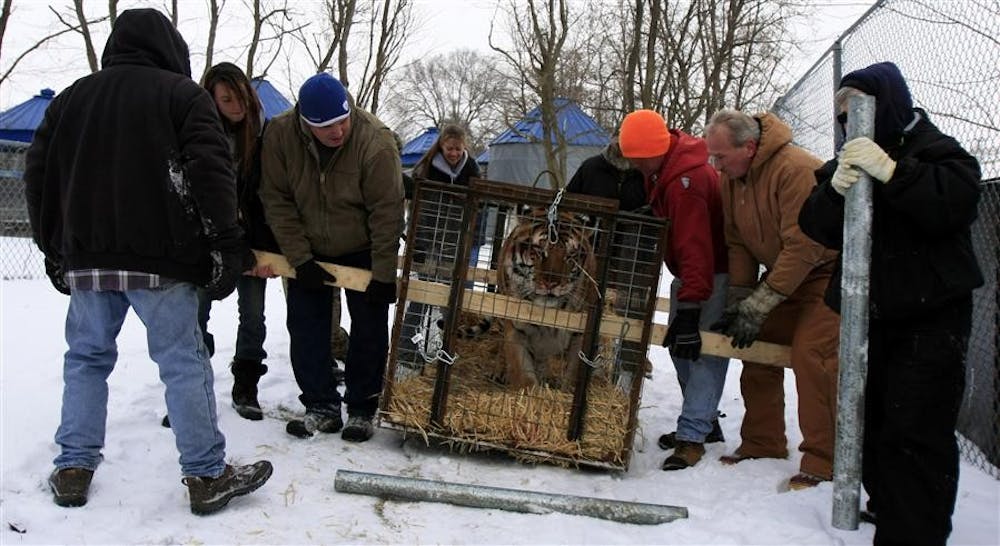Lions, tigers and bears — the furry triumvirate that famously inspired fear in “The Wizard of Oz” is truly a dangerous one. However, in recent years, these kinds of dangerous animals have been found in a much less fantastical place: people’s backyards.
The Internet has made it easier than ever to acquire exotic animals as pets, said Monica Engebretson, senior program associate for Born Free USA, a national animal advocacy nonprofit.
“What we’ve kind of seen with the Internet is that it has made it much easier for sellers to connect with buyers,” she said. “Before, people wouldn’t even know where to go if you wanted to find a monkey.”
As a result, people have been able to acquire exotic pets without fully understanding the responsibilities or consequences of housing such an animal, she said.
Terry Thompson, an Ohio man who recently committed suicide after turning loose more than 50 exotic animals from his property, was deeply in debt before he released his animals, most of which were eventually gunned down by police. His flock included Bengal tigers, monkeys, leopards and grizzly bears, among others.
Joe Taft has been the director of the Exotic Feline Rescue Center in Center Point, Ind., for more than 20 years. He attested to both the difficulties and the dangers of keeping such animals as pets.
“They are not cheap,” he said. “They will eat your kids. They’re a threat to neighbors and can cause you to lose homeowner’s insurance.”
Taft’s center is the largest federally licensed collection of big cats in the United States. It provides a home for endangered or neglected cats from around the country for the rest of their lives. He said although big cats are capable of adapting to captivity better than many other exotic animals, the proper care is an absolute necessity.
“That’s not to say they do well in an 8-by-10 cage when you don’t feed them,” Taft said.
“They don’t make good pets in the sense of companion animals or animals that can lie in your house,” he said. “They are incredibly dangerous animals that take specialized housing and specialized veterinarian care.”
Ohio is one of fewer than 10 states in the country that have no rules regulating the ownership or sale of exotic pets. Indiana’s laws are more stringent. The state is one of 13 requiring that people apply for a permit. The application process includes undergoing a facility inspection prior to obtaining the animals, said Linnea Petercheff, operations staff specialist for the Indiana Department of Natural Resources.
Among the requirements are fences of a certain height and material, including one that prevents outsiders from getting close to the animals, Petercheff said. The permits also require yearly renewal in conjunction with inspections by both a conservation officer and veterinarian of the facilities and the animals themselves.
“All permit holders are also subject to unannounced exams at any time of the year,” she added.
Although Indiana’s laws are stricter than some states, Engebretson said they have some room for improvements. Born Free USA has a model that states would ideally follow when making their exotic pet laws.
“Permits are difficult to enforce,” she said. “It takes someone to notice and the officers to go out and check it. Someone checking up is a huge cost, and a ban is just much easier. That way there is no grey area or neighbors saying, ‘I don’t know if this is legal or not.’ With a ban, there’s no question. You’re not supposed to have them.”
Taft, whose facility is a federally licensed organization, said Indiana does a good job enforcing its permits, making them fairly difficult to obtain with high housing standards and a solid inspection program.
“I’m really happy with what I see out of the state,” he said. “They don’t give out the permits to just anyone, and they do a good job of keeping an eye on the people who have them.”
While Petercheff said there have been no discussions of revisiting Indiana’s exotic animal laws, she wanted to stress the difficulties that come along with care-taking for such animals.
“We want to make it clear that a permit is required and that people need to be aware of the work and the money and time involved in housing these animals,” she said. “It should not be taken lightly. Purchasing a cat as a young animal is much different than when it’s grown.”
Taft echoed her sentiment before adding his own take on legislation about the animals.
“Regulations are a pretty complex matter,” he said. “They are not the black-and-white matter like people try to make out of it.”
Indiana’s laws about owning exotic animals more strict than others

Get stories like this in your inbox
Subscribe





